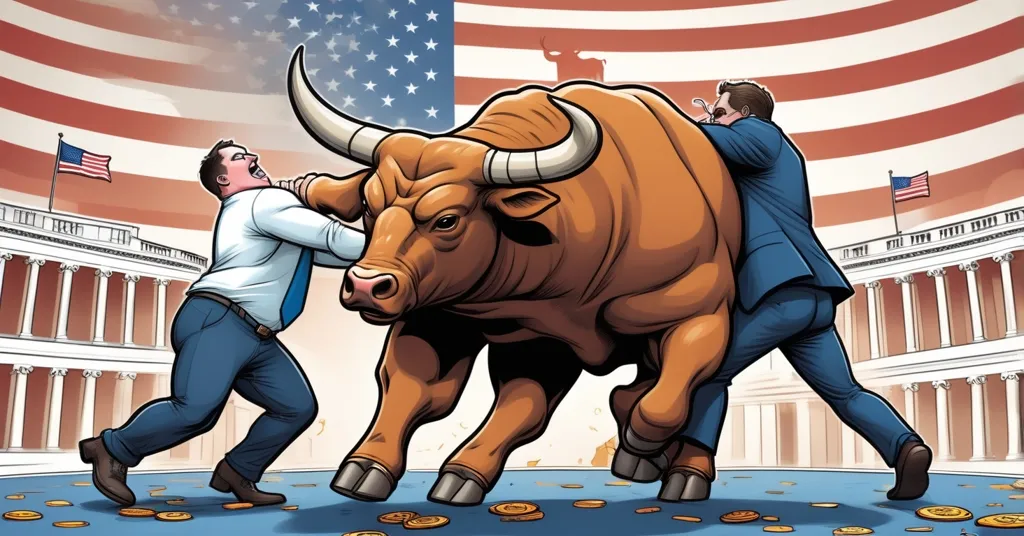U.S. Treasury Secretary Backs Historic Crypto Bill, Ignites Capitol Clash

U.S. Treasury Secretary Scott Bessent Endorses Historic Crypto Regulation Bill, Sparking Capitol Showdown
U.S. Treasury Secretary Scott Bessent has thrown his weight behind a groundbreaking crypto bill during a recent House Financial Services Committee hearing. This move could position the United States as a leader in the digital asset space, but it has also ignited a fierce partisan battle in Congress.
- U.S. Treasury Secretary endorses crypto bill
- Aims to make U.S. a premier destination for digital assets
- Partisan clash ensues over President Trump’s crypto involvement
Bessent’s Endorsement
During the hearing on May 7, Scott Bessent made it clear that the United States needs to step up its game in the world of digital assets. He underscored the importance of developing a “good market structure,” which essentially means a clear set of rules and regulations for trading digital assets. Bessent’s vision is for the U.S. to become the “premier destination for digital assets,” a bold statement that sets the stage for a potential revolution in how we view and use cryptocurrencies.
“We believe the United States should be the premier destination for digital assets,”
Bessent went further to highlight the strategic economic angle, suggesting that digital assets, particularly through stablecoin legislation, could drive the global usage of the U.S. dollar. Stablecoins are cryptocurrencies designed to maintain a stable value, often pegged to a currency like the U.S. dollar, which could serve as a bridge between traditional finance and the burgeoning crypto economy.
“Digital assets are an important source of innovation that can drive usage of the U.S. dollar around the world with stablecoin legislation,”
The Digital Asset Market Structure Bill
The Digital Asset Market Structure Bill, introduced by House Republicans on May 5, is a collaborative effort between the House Financial Services and Agriculture Committees. This bill aims to bring much-needed regulatory clarity to the digital asset market. Representative French Hill, the Chair of the House Financial Services Committee, emphasized the bill’s objectives:
“Our discussion draft builds upon that work and provides much-needed regulatory clarity for the digital asset ecosystem by protecting consumers and safeguarding the long-term integrity of digital asset markets in the United States.”
The bill’s focus on regulatory clarity means establishing clear guidelines that protect consumers and ensure the integrity of the digital asset markets. This could mean setting standards for transparency, security, and compliance, which are crucial for the mainstream adoption of cryptocurrencies.
Political Challenges
However, the crypto bill has not been welcomed with open arms by all. A partisan clash erupted during the hearing, with Democrats, led by Maxine Waters, protesting due to concerns over President Trump’s involvement with cryptocurrencies. Waters, a vocal critic of the crypto industry, raised objections:
“I object to this joint hearing because of the corruption of the President of the United States and his ownership of crypto and his oversight of all the agencies.”
Her concerns stem from Trump’s and his family’s ventures into memecoins, stablecoins, and other tokens, which she sees as a conflict of interest. This political circus threatens to derail what could be a pivotal moment for the crypto industry. In Washington, where political gridlock is as common as coffee breaks, the crypto bill faces a steep climb.
Maxine Waters has planned an alternative Democratic hearing on May 6 to discuss a path forward for cryptocurrency legislation that addresses Trump’s conflicts of interest, adding another layer of complexity to the political dynamics at play.
Potential Impact and Counterpoints
The endorsement by a high-ranking official like Bessent is a significant step toward regulatory clarity and legitimacy for the cryptocurrency industry. If the bill passes, it could boost investor confidence by providing a clear regulatory framework. This could be particularly beneficial for Bitcoin, which could see increased adoption as a safe and regulated asset.
However, the crypto community isn’t all on board. Some argue that too much regulation could stifle innovation and go against the spirit of decentralization that cryptocurrencies were built on. Others point out that while the bill focuses on regulatory clarity, it might not address all the nuances of the crypto ecosystem, especially the roles of altcoins in filling niches that Bitcoin might not serve well.
Despite these concerns, the potential global impact of the U.S. embracing digital assets is undeniable. It could position the U.S. as a leader in the crypto space and strengthen the global reach of the U.S. dollar through stablecoin legislation. The bill’s discussion draft being open for public feedback is a positive sign of an inclusive approach, but whether it can navigate the political waters remains to be seen.
Key Questions and Takeaways
What is the significance of Scott Bessent’s endorsement of the crypto bill?
Bessent’s endorsement signals strong support from the U.S. Treasury for regulating digital assets, aiming to position the U.S. as a leader in the crypto space and enhance the global reach of the U.S. dollar through stablecoin legislation.
What is the Digital Asset Market Structure Bill and what are its goals?
The bill is a legislative proposal introduced by House Republicans to provide regulatory clarity for the digital asset market. Its goals include protecting consumers and safeguarding the integrity of digital asset markets in the U.S.
Why did some Democrats protest the crypto legislation hearing?
Democrats, led by Maxine Waters, protested due to concerns over corruption and conflicts of interest related to President Trump’s ownership and oversight of agencies involved with cryptocurrencies.
What challenges does the crypto legislation face in Congress?
The legislation faces challenges due to political gridlock and partisan clashes, which could hinder its advancement and implementation.
How might this legislation impact Bitcoin and the broader crypto market?
The bill could provide regulatory clarity that boosts investor confidence in Bitcoin and other cryptocurrencies, while also recognizing the niche roles that altcoins play in the ecosystem.
What are the broader implications for decentralization and financial freedom?
If passed, the bill could align with the values of decentralization and financial freedom by fostering a more inclusive and transparent digital asset market.



